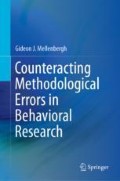Abstract
Nonprobability sampling selects units nonrandomly. It is very common in the behavioral science research, for example, psychology freshmen or Internet users are asked to participate in a study. Moreover, a probability sample becomes a nonprobability sample if some of the selected persons are nonrandomly missing or drop out of the study. Nonprobability sampling is threatened by systematic errors that bias the study results. Three procedures are described to control for bias. First, representative sampling: a sample is selected that is judged to be representative for the population. Second, applying weighting procedures in the analysis of the data. Third, comparing study results across different subpopulations (e.g., males and females, younger and older participants, and so on). If study results are approximately the same across different groups, generalization of the study results is supported. However, generalization from a nonprobability sample to a population cannot be based on statistical theory. Therefore, probability sampling has to be preferred above nonprobability sampling .
Access this chapter
Tax calculation will be finalised at checkout
Purchases are for personal use only
References
Bethlehem, J. (2010). Selection bias in web surveys. International Statistical Review, 78, 161–188.
Field, A. P., & Gillett, R. (2010). How to do a meta-analysis. British Journal of Mathematical and Statistical Psychology, 63, 665–694.
Henrich, J., Heine, S. J., & Norenzayan, A. (2010). The weirdest people in the world? Behavioral and Brain Sciences, 33, 61–135.
Rosenthal, R., & Rosnow, R. L. (1975). The volunteer subject. New York, NY: Wiley.
Author information
Authors and Affiliations
Corresponding author
Rights and permissions
Copyright information
© 2019 Springer Nature Switzerland AG
About this chapter
Cite this chapter
Mellenbergh, G.J. (2019). Nonprobability Sampling. In: Counteracting Methodological Errors in Behavioral Research. Springer, Cham. https://doi.org/10.1007/978-3-030-12272-0_3
Download citation
DOI: https://doi.org/10.1007/978-3-030-12272-0_3
Published:
Publisher Name: Springer, Cham
Print ISBN: 978-3-319-74352-3
Online ISBN: 978-3-030-12272-0
eBook Packages: Behavioral Science and PsychologyBehavioral Science and Psychology (R0)

